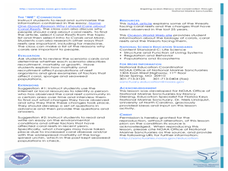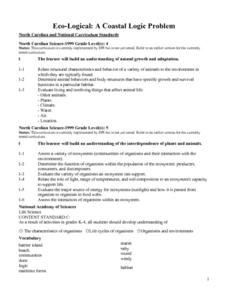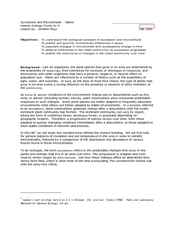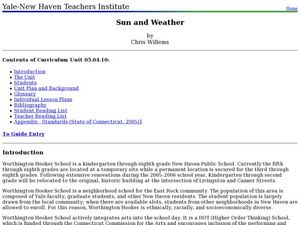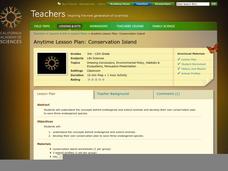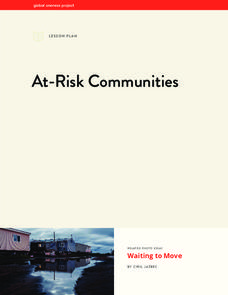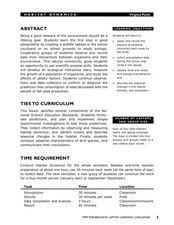Virginia Department of Education
Ecosystem Dynamics
Searching for an eccentric way to enhance lessons on ecosystems while ensuring pupils remain creative and motivated? Upon viewing The Lorax by Dr. Seuss, designated groups design and construct a pop-up book that depicts the specific ways...
Curated OER
Benthic Macroinvertebrates
Learners survey and describe a stream ecosystem. They sample the benthic macroinvertebrate populations of a given stream and determine community structure through the use of the Chandler Index and a species diversity index.
Curated OER
The Changing Coral Reef
Students record changes in the composition of a coral reef. In this Coral Reef activity, students recognize the needs of Coral Reef species to survive. Students chart changes in population over time. Students write an essay about...
CFR Washington
Urbanization and Wildlife
Urbanization and how it affects wildlife is the focus of a presentation that uses statistics to make a case for concern and change.
Curated OER
Species Interactions
Students study the scientific concepts of biodiversity and conservation through the use of basic equations of population growth and hands-on experiments/simulations. The lesson includes a take-home assignment which can be used for final...
Curated OER
Volcano Above the Clouds
Students develop a travelogue to describe the distinct ecological regions of Mount Kilimanjaro. They describe the health issues that may affect climbers, and any necessary equipment or safety precautions that the team may need at each...
Curated OER
Eco-Logical: A Coastal Logic Problem
Fourth graders study the characteristics of five coastal communities. They use logic cards and matching activities to identify the proper community for plant and animal species.
Curated OER
Succession and Microclimate
Students compare the population of insects in different microclimates. In this biology lesson, students collect data using probes to tabulate temperature and soil data. They predict how certain parameters change as an area goes through...
Curated OER
Ecosystem Interdependence
Students outline a scenario demonstrating ecosystem interdependence. They explain the effects of this change according to the food web. They give a positive example such as increased rain and have the students call out answers to your...
Curated OER
Sun and Weather
How is the Earth's weather created? Middle schoolers will explain how the Sun's energy is transformed into different forms. They will perform mathematical calculations of volume, mass, and temperature. They they will explain the...
Curated OER
Earth's Ecosystem: Seven Major Biomes
Students discuss the different types of ecosystems and the composition of biomes. Working in groups, they define various related terms and make posters of them. Then they explain their posters to the class.
Curated OER
Pharaoh Mountain Hike: Investigating Adirondack Life Zones
Students hike a local mountain and examine its life zones. They measure various components at each zone and collect leaf litter at the sites. At the mountain top, students make descriptive observations and complete a handout about the...
Howard Hughes Medical Institute
Modeling Food Webs in Darién, Panama
It's a jungle out there! Young biologists journey to Darien, Panama to examine the intricate relationships between the organisms that inhabit the jungle. Groups begin by demonstrating an understanding of energy flow in ecosystems, then...
California Academy of Science
Conservation Island
Why not walk in the footsteps of Teddy Roosevelt and become a conservationist? After discussing issues and reasons for animal extinction, the class creates their own conservation plans. Each small group is given mock data regarding a...
Global Oneness Project
At-Risk Communities
"Waiting to Move," a photo essay by Ciril Jazbec, brings into sharp focus the threats posed by climate change. Class members examine images of Shishmaref Island and the Native Alaskan Inupiate coastal villages that are impacted by rising...
Curated OER
Praire Biome Models
Fifth graders, in groups, list the physical characteristics of a biome and think of ways in which animals might have to adapt to live there and make a biome mobile ball that show the different types of habitats that shape the praire biome.
Curated OER
Soil: Food Mapping
Young scholars examine the concept of food mapping . In this agriculture instructional activity, students explore food and agriculture systems in the United States in the past and today. Young scholars complete food mapping activities.
Curated OER
Ecosystems: A Home By Any Other Name
Students can learn more about the parts of ecosystems through exploration and hands on activities.
Curated OER
Biomimicry, Nature: Architecture of the Future
Students explore the relationship between nature and architecture. In this cross curriculum history, culture, and architecture lesson, students observe and discuss structures visible in nature. Students view websites in which Native...
Curated OER
Habitat Dynamics
Students develop an interactive diary to record bird seed consumption. In this habitat instructional activity, students predict and record the amount of birdseed eaten each week by birds.
Curated OER
Flipbook Succession
Students review succession charts for their native area before going to an outside site to view the changes. At the site, they follow the transect line and observe the changes in the plant life. They draw the changes on note cards that...
Curated OER
Flowering Phenology: How Do Plants Know When to Flower?
Students study the process of plant reproduction and the biotic and abiotic factors that affect flowering phenology. In this plant reproduction lesson, students describe the interaction of environmental factors as it relates to...
Curated OER
Finding the Basal Area of a Forest Plot to Determine Stocking Levels
Learners use graphs and plots to measure the basal area and stocking levels. In this graphing instructional activity students work in the field the use their data to help them complete a lab activity.
Curated OER
A Living Watershed
Students, through this series of lessons, use local resources, speakers, print and video materials, as well as standard text materials to study the ecosystem of the local watershed.




